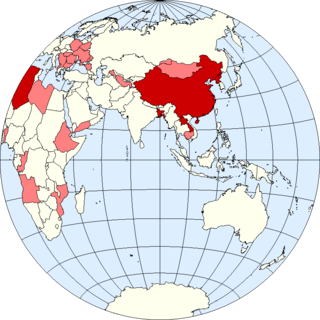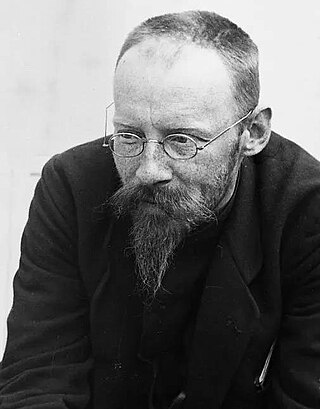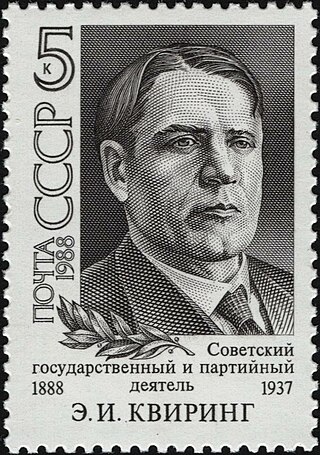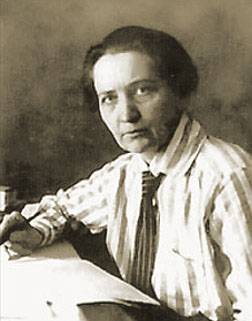
The Russian Civil War was a multi-party civil war in the former Russian Empire sparked by the overthrowing of the social-democratic Russian Provisional Government in the October Revolution, as many factions vied to determine Russia's political future. It resulted in the formation of the Russian Socialist Federative Soviet Republic and later the Soviet Union in most of its territory. Its finale marked the end of the Russian Revolution, which was one of the key events of the 20th century.

The Communist International (Comintern), also known as the Third International, was an international organization founded in 1919 that advocated world communism, and which was led and controlled by the Communist Party of the Soviet Union. The Comintern resolved at its Second Congress in 1920 to "struggle by all available means, including armed force, for the overthrow of the international bourgeoisie and the creation of an international soviet republic as a transition stage to the complete abolition of the state". The Comintern was preceded by the dissolution of the Second International in 1916. Vladimir Lenin and Leon Trotsky were both honorary presidents of the Communist International.
The Polish minority in the Soviet Union are Polish diaspora who used to reside near or within the borders of the Soviet Union before its dissolution. Some of them continued to live in the post-Soviet states, most notably in Lithuania, Belarus, and Ukraine, the areas historically associated with the Polish–Lithuanian Commonwealth, as well as in Kazakhstan and Azerbaijan among others.

People's republic is an official title that is mostly used by current and former communist states, as well as other left-wing governments. It is mainly associated with soviet republics, socialist states following the doctrine of people's democracy, sovereign states with a democratic-republican constitution that usually mentions socialism, as well as some countries that do not fit into any of these categories.

A show trial is a public trial in which the guilt or innocence of the defendant has already been determined. The purpose of holding a show trial is to present both accusation and verdict to the public, serving as an example and a warning to other would-be dissidents or transgressors.

Christian Georgiyevich Rakovsky, Bulgarian name Krastyo Georgiev Rakovski, born Krastyo Georgiev Stanchov, was a Bulgarian-born socialist revolutionary, a Bolshevik politician and Soviet diplomat and statesman; he was also noted as a journalist, physician, and essayist. Rakovsky's political career took him throughout the Balkans and into France and Imperial Russia; for part of his life, he was also a Romanian citizen.

The Communist Party of Ireland (CPI) is a Marxist–Leninist party, founded in 1933 and re-founded in 1970 and active in the Republic of Ireland and Northern Ireland. It rarely contests elections and has never had electoral success. The party is a member of the International Meeting of Communist and Workers' Parties.
The Organisation of Ukrainian Nationalists was a Ukrainian nationalist organization established in 1929 in Vienna, uniting the Ukrainian Military Organization with smaller, mainly youth, radical nationalist right-wing groups. The OUN was the largest and one of the most important far-right Ukrainian organizations operating in the interwar period on the territory of the Second Polish Republic. The OUN was mostly active preceding, during, and immediately after the Second World War. Its ideology has been described as having been influenced by the writings of Dmytro Dontsov, from 1929 by Italian fascism, and from 1930 by German Nazism. The OUN pursued a strategy of violence, terrorism, and assassinations with the goal of creating an ethnically homogenous and totalitarian Ukrainian state.

Vsevolod Mikhailovich Eikhenbaum, commonly known by his pseudonym Volin, was a Russian anarchist intellectual. He became involved in revolutionary socialist politics during the 1905 Russian Revolution, for which he was forced into exile, where he gravitated towards anarcho-syndicalism.
The history of communism encompasses a wide variety of ideologies and political movements sharing the core principles of common ownership of wealth, economic enterprise, and property. Most modern forms of communism are grounded at least nominally in Marxism, a theory and method conceived by Karl Marx and Friedrich Engels during the 19th century. Marxism subsequently gained a widespread following across much of Europe, and throughout the late 1800s its militant supporters were instrumental in a number of unsuccessful revolutions on that continent. During the same era, there was also a proliferation of communist parties which rejected armed revolution, but embraced the Marxist ideal of collective property and a classless society.

Volodymyr Kyrylovych Vynnychenko was a Ukrainian statesman, political activist, writer, playwright and artist who served as the first prime minister of the Ukrainian People's Republic.

Andrei Sergeyevich Bubnov was a Russian Bolshevik revolutionary leader, one of Bolshevik leaders in Ukraine, Soviet politician and military leader and member of the Left Opposition.

Georgy (Yury) Leonidovich Pyatakov was a Ukrainian revolutionary and Bolshevik leader, and a key Soviet politician during and after the 1917 Russian Revolution. Pyatakov was considered by contemporaries to be one of the early communist state's best economic administrators, but with poor political judgement.

Mykola Oleksiiovych Skrypnyk, was a Ukrainian Bolshevik revolutionary and Communist leader who was a proponent of the Ukrainian Republic's independence, and later led the cultural Ukrainization effort in Soviet Ukraine. When the policy was reversed and he was removed from his position, he committed suicide rather than be forced to recant his policies in a show trial. He also was the Head of the Ukrainian People's Commissariat, equivalent to the modern-day position of Prime Minister of Ukraine.

Grigory Ivanovich Petrovsky was a Ukrainian Soviet politician and Old Bolshevik. He participated in signing the Treaty on the Creation of the Union of Soviet Socialist Republics and the Treaty of Brest-Litovsk. Petrovsky was Communist Party leader in Ukraine until 1938, and one of the officials responsible for implementing Stalin's policy of collectivization.

Emmanuel Ionovich Quiring was a Soviet politician and statesman of Volga German descent. Due to transliteration, he may have spelled his family name as Kviring or Kwiring.

The Ukrainian Social Democratic Labour Party, also commonly known as Esdeky, was a social-democratic political party in the Ukrainian People's Republic. The party was reformed in 1905 at the Second Congress of the Revolutionary Ukrainian Party and was pursuing Marxism through the Social Democratic Party of Germany's Erfurt Program as well as national and cultural autonomy. Party leaders were Volodymyr Vynnychenko, Symon Petliura, Mykola Porsh, Dmytro Antonovych, Lev Yurkevych, Mykhailo Tkachenko, and Mykola Kovalsky.

Yevgenia BogdanovnaBosch was a Ukrainian Bolshevik revolutionary, politician, and member of the Soviet government in Ukraine during the revolutionary period in the early 20th century.
The Provisional Workers-Peasants Government of Ukraine was a provisional Soviet government created on November 28, 1918, in Kursk on decision of the Communist Party of Ukraine and help of the Russian Workers-Peasants Red Army (RKKA), with its place of location was assigned the city of Sudzha. On the same day the government released its manifest. This Soviet government was created in the very same way as the Provisional Workers' and Peasants' Government of Belorussia which on 1 January 1919 also issued its manifest in Minsk. The Provisional Workers-Peasants Government of Ukraine became the highest legislative, executive and administrative body of Soviet power in Ukraine as Soviet Russia resumed hostilities against Ukraine.
A workers' council, also called labor council, is a type of council in a workplace or a locality made up of workers or of temporary and instantly revocable delegates elected by the workers in a locality's workplaces. In such a system of political and economic organization, the workers themselves are able to exercise decision-making power. Furthermore, the workers within each council decide on what their agenda is and what their needs are. The council communist Antonie Pannekoek describes shop-committees and sectional assemblies as the basis for workers' management of the industrial system. A variation is a soldiers' council, where soldiers direct a mutiny. Workers and soldiers have also operated councils in conjunction. Workers' councils may in turn elect delegates to central committees, such as the Congress of Soviets.














